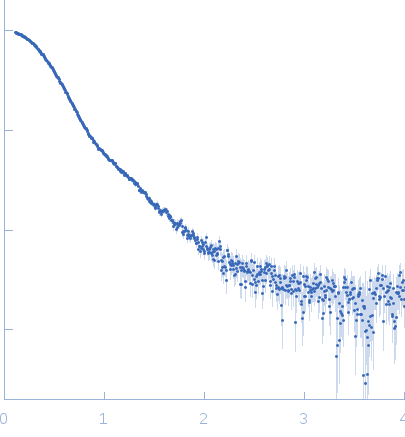|
X-ray synchrotron radiation scattering data from solutions of complex ComE-comcde in 50 mM MES 500 mM NaCl, 5% (vol/vol) glycerol, 5 mM β-mercaptoethanol were collected on the SWING beamline on the storage ring SOLEIL (Saint-Aubin, France) using a CCD AVIEX detector (s = 4π sin θ/λ, where 2θ is the scattering angle). The sample was loaded on a SE-HPLC column on line with the SAXS measuring cell. The data were normalized to the intensity of the transmitted beam and radially averaged; the scattering of the solvent-blank was subtracted. The scattered intensities were displayed on an absolute scale (cm-1) using the scattering of water. Frames were examined individually and 6 identical frames were averaged and further processed. The corresponding concentration was 0.8 g/L.
Use of SAXS to describe the interaction between the phosphorylated mimetic mutant ComED58E of the response regulator ComE from S. pneumonia and its promoter region comcde.
The complex is constituted of one dimer of ComE and one monomer of comcde.
The SAXS data were collected directly after elution through an on-line size-exclusion high-performance liquid chromatography (SEC-HPLC) column.
The molecular weight is not estimated from I(0) because the concentration of the complex cannot be accurately determined. It is obtained from the macromolecule volume using the method developed by Craievich’s team (the SAXS Mow program).
|
|
comcde
|
| Mol. type |
|
DNA |
| Organism |
|
Streptococcus pneumoniae |
| Olig. state |
|
Other |
| Mon. MW |
|
23.5 kDa |
| Sequence |
|
FASTA |
| |
|
Response regulator
(ComE)
|
| Mol. type |
|
Protein |
| Organism |
|
Streptococcus pneumoniae |
| Olig. state |
|
Dimer |
| Mon. MW |
|
30.7 kDa |
| |
| UniProt |
|
Q8DMW5
(1-250)
|
| Sequence |
|
FASTA |
| |
|
 s, nm-1
s, nm-1
